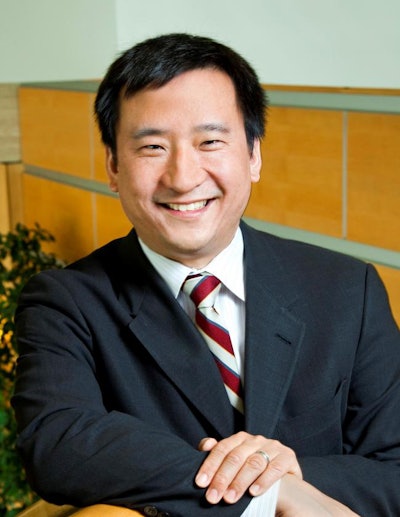I am compelled to confess my complicity in bias. As much as I might suspect that I have been affected by prejudice in my career, even among academics who pride themselves as enlightened, I know that I have failed to act when I could have, in the face of inappropriate decision-making. I also am aware that I have engaged in such conduct myself. I am persuaded by the research which shows we all do it: each of us has been exposed to an abundance of stereotypes, even if we would prefer to resist them, with the consequence that we have these images in our heads despite our denials — our good faith does not save us from our own unconscious.
Over a quarter century in higher education, including stints with fancy titles such as chancellor and dean and even trustee, I have been exposed to various expressions that should have prompted at least an, “Excuse me?”
 Frank Wu
Frank WuI have been in the room, for example, when a professor has doubted the credentials of an African American applicant and requested additional references, and then when the same colleague has raised objections again about qualifications as to other black scholars — but not on the same record presented by white peers. The implication was the minorities had benefited from preferences, which needed to be discounted (a sentiment declared explicitly later). I have been among administrators when one complained about a finalist to be a dean, potentially an equal among us, because the individual, an immigrant, had a “heavy accent” and could not be understood. That assessment could be attributed not to the speaker but to the listener, and it was a perception I did not share.
There are people who in legal terms are “similarly situated” but have very different compensation packages. The one who is favored has the powerful friends. I have seen the hiring of a big name without any troubling over the person’s role advocating against undocumented persons, contrary to the institutional policies that are touted as welcoming in that specific regard, and dismissal of concerns about these publications.
Those are just the incidents involving race and ethnicity. There are others involving age and gender. If I were asked, I would answer that I have seen these wrongs perpetrated by people of color, too. Although it is less common owing to fewer opportunities, I would not make an ideological claim that minorities are immune from these human failings. Everyone, whatever their position, can demean someone else, there being no end of dividing lines to be drawn.
The problem is that few cases are clear. I always suffer a moment of surprise about racism, since contrary to what critics might suppose I am not expecting it. So I am confused, wondering if I imagined it. When I recover my senses and confirm it was what I thought it was, I am all the more shocked.
You learn to make the snap judgment whether to let it pass. You have to be prepared for the backlash if you stand up and speak out, that you don’t appreciate humor and irony, that you are overreacting and politically correct. It is impossible to respond to every transgression, and there are ambiguities, a scale of sins, and one’s own mixed motives. When I am presiding over a meeting, dependent on tenuous politics, I merely appear to be privileged. I would be accused of abusing the authority of the chair to call out a seeming subordinate, embarrassing them for what might be minimized as a breach of etiquette. When I have been an equal in name, albeit junior in the ranks, I have been unduly deterred by the prospect of my own career. At least in a few of these episodes, others have not hesitated.
I am making excuses of course. I remember when I had a callback for a tenure-track job, the first time I had a campus interview. One of the senior faculty members introduced himself with the remark, “How appropriate we have the Asian candidate today.” I wasn’t astute enough to realize what his reference was, until after I had delivered my talk. It was December 7, the anniversary of the Japanese Imperial Navy attack on Pearl Harbor, Hawaii, a “day which shall live in infamy” for bringing the United States into World War II. He had been smiling when he said what perhaps he intended as a joke, never mind that I was a Chinese American, who would not have called himself “the Asian candidate” in a show of tokenism. (If I recall accurately, I received an offer anyway.)
So I write all of this to reinforce my resolve. I have a duty, as each of us does. I want to say it aloud to commit myself. Ironically, those of us who advocate against discrimination in the abstract or elsewhere might become uncertain of our ideals or reluctant as soon as a concrete instance is in front of us among people with whom we interact regularly. We want to be liked. We don’t know what has prompted someone to interject as they have.
If we confront these issues, we will make people less comfortable. That is the point of doing so. They might be able to explain, being clever enough. Yet even if they do not change their attitude, they will pause before they exhibit the behavior.
Frank H. Wu is the William L. Prosser Distinguished Professor at the University of California Hastings College of the Law.


















